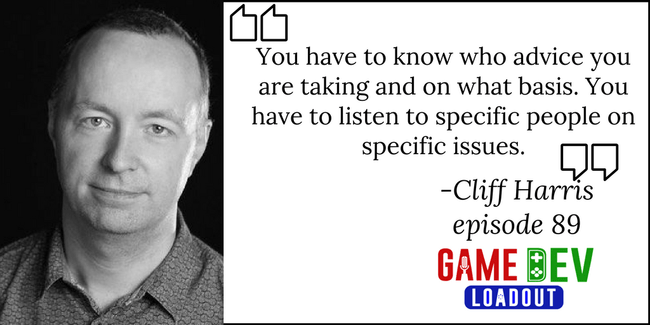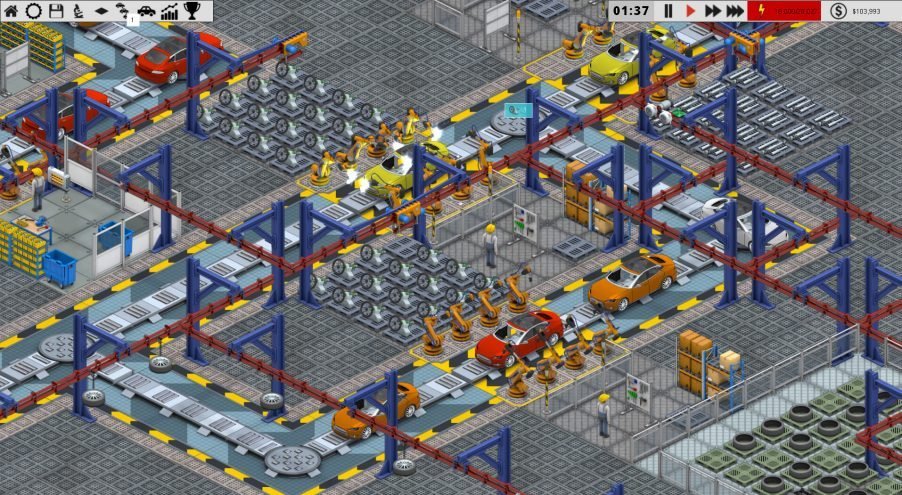The Game Dev Loadout podcast (here and here) has shared their recent Cliff Harris interview with us. The original interview transcription is at Game Dev Loadout. You can also see more podcast interviews from Game Dev Loadout here on GameDev.net.
Game designer, programmer, and running a one-man games business, Cliff Harris of Positech Games (@cliffski32 on GameDev.net) is behind strategy and simulation games such as Production Line, Democracy, and Gratuitous Space Battles.
In this interview, Cliff talks about his journey in the game industry, emphasizes on making sure you are taking advice from the right people, and why you need to invest in a great chair for yourself and your team.

How did you get started in the game industry?
I started programming as a kid when I was 11 on a tiny home computer and then I kind of got out of computers, had all sorts of weird careers working on the stock market and in I.T and boat building and playing the guitar. I taught myself C++ from a home study course on floppy disks then I started making games and that was 20 years ago so it was before indie games were really a thing. I worked at Elixir Studios and Lionhead for 3 years and then I quit that and been full-time indie ever since.
It became possible with the internet that you could program games from home on your own.
What was that push that made you join the game industry?
At that time in the U.K, you couldn’t get a job as a programmer unless you had a former qualification as a programmer or you already had a job as a programmer. I always wanted to program video games like a lot of people did and it became possible with the internet that you could program games from home. It was a hobby that turned into a career and a proper business.
What is something we probably don’t know about in AI mechanic that we should know?
The thing that people don’t realize about AI is that it’s very easy to make something seem alive with few lines of code. Like I have two cats and they really both are predictable. Sometimes the way my cats behave I think you are just few thousand lines of C++. When you break it down, it’s not that difficult to program NPC’s in games that behave and move in quite a natural way.
It’s funny because some stuff that you consider easy, it’s almost impossible. So like finding your way out of a maze, we’re pretty good at that but computers are rubbish at it. If you want to program an NPC with text so that it seems to converse with you in a way that doesn’t seem too scripted, that’s not too hard. The reason people tend to encounter rubbish NPC in AI games is due to an obsession with having voice acting for everything. It’s easy to program an NPC that can talk to you about 100 different topics with thousands of different variations that sound fluent and responsive to you. But if you want to record a thousand lines of dialogue and you have got some big name actor then, you can’t afford it. So that’s actually the bottleneck.
The other possibility is the translation. The problem is the minute you translate it to German, it’s absolute chaos. The sentence structure is different and you obviously have to pay a little bit to translate the text into German. And if you have got like 20 languages and there are tons of different phrases in each language, suddenly that’s what becomes expensive and difficult. But as you program, it’s fairly easy and fun.

Production Line
Would you suggest new developers stick to text or voice acting?
If you want to capture the whole audience and to have a successful indie game, you probably are going to want it in like 10 different languages. So to get it professionally done is probably like 10 cents a word. So every time you type like one line of dialogue, it’s going to cost you like 50 dollars. If you want to record the audio and then you want that in 10 languages, that’s going to cost you even more. And does it really add to the experience? I’m not sure it does. And the other thing is that I am very impatient and I value time a lot so I’d rather read the dialogue personally than hear it.
I want to talk about the worst moment of your career, that one moment that’s still vivid in your mind.
They are a few. I have left a game company in a very heated argument, which is funny because I recently bumped into the guy I had that argument with and he’s fine, and I am fine and we get along, but it was just really stressful.
I have had bugs that are really bad. I had a bug that could potentially destroy someone’s computer and someone reported a problem to me and I was like “No, I am sure this is not a bug of mine” and I looked into it and I did a lot of experimentation to get this bug to trigger on my PC. I thought “Oh my God, I cannot believe I had made this mistake.” Yeah, I remember frantically coding this patch for it and putting it out immediately and no one else got infected by it. But I was really worried. It was a very rare circumstance but it would delete stuff on your hard drive. It started happening to me but people had anti-virus so it was like a flag going “Hey, what are you doing?”
Ultimately very few people come into the industry for money because there isn't much. So generally you realize that everyone is here just to try to make cool games and work on great stuff.
That’s a reputation-destroying bug that deleted a file where the player goes to delete some content intentionally and under certain circumstances, the file name that would be passed in would be empty and given the structure of that code it would then start to delete everything. I had to make loads of checks in all of the areas of my game that can never delete a file. There’s so much code wrapped around this and I can never ever get into that position again because that was bad.
From the heated argument story, how did you handle the situation and what was the outcome?
Well, I handled it badly, actually, everyone handled it badly. I mean, I had been in this company too long and I was very frustrated and sort of wanted to leave but I had stayed on the assumption that things would change. I just lost it, I got into a very strong argument and someone there had stormed off. And that was it, that was how I left. Looking back on it, I stayed in the company too long. I am very Indie, I don’t like working for other people. I am not very easy to employ because I am quite outspoken and maybe not massively respectful of authority. So it was kind of like a bad fit. To be honest I have stormed out of another job as well.
So what should we take away from that experience?
The game industry is a lot like the music industry because almost everyone in the music industry makes no money and some people make piles of money. And then there are many more people who want to be in games than the industry will support, which is a lot like music. So you end up with very stressed people who are doing what they love doing, they are very passionate about it and very intensely into it and they are working very hard. It is basically a recipe for everyone to get into huge fights and hate each other. It’s a bit better now I think but there were a lot of companies where people would work very long hours and they would work very late and they go beyond what you would normally put into a job. They aren’t massively well paid at any point.
Also, the game industry attracts people like me who are fairly introverted, so we have good technical skills but not very good people skills. You put all that together and it is going to be tough. But I don’t think people hold grudges, I mean I have had two huge arguments with people, some famous and some not and always ended up getting along with them because ultimately very few people come into the industry for money because there isn’t much. So generally you realize that everyone is here just to try to make cool games and work on great stuff no matter how much we like kind of get on each other’s nerves.
You have to know whose advice you are taking and on what basis.
What are bad recommendations that you hear in your profession?
There are a lot of people that will give you advice. Like if you go on to Reddit and sort of say “Oh I am thinking of making this game, oh I am thinking of porting to this platform”. You will get a massive amount of advice and almost all of it will be rubbish. That’s because the people who are always on Facebook, Twitter and Reddit, just sit there, waiting on giving advice to others. I am never like I have to go there and post it and see if anyone is ever asking about something I know about. I’ve read a huge amount of stuff that says there is no point in advertising your indie game.
Some of them might say that I have spent like a $100 on Facebook Ads, I didn’t notice any difference in the number of downloads of my game and what you can take from that is you know one person who spent a $100, they did not receive a direct difference. I’ve spent $265,000 on Facebook Ads over the years, so as you can imagine I am pretty convinced they work. But what I am saying is that I have literally a thousand times more data points on that issue. So if you see me talking about the Pro’s and Con’s of Facebook Ads, well I know what I am talking about. If you hear me talking about whether Android or iPhone is a better platform, then just slap me and tell me “Cliff you have no idea, no you don’t know anything about it”. Because you have never made a mobile game and I think that’s the most important thing, you have to know whose advice you are taking and on what basis.
We will have an intuition about games and stuff and what should work, what shouldn’t work and often our intuition is wrong. I honestly think that free to play should not work but it clearly does. I think that there is no way you can run an entire games business based on selling virtual hacks, I know that cannot possibly work. But I know it does. So you have to listen to specific people on specific issues.
Make some sort of investment in your comfort because in the end you spend a lot of time sitting in front of the keyboard and it's so much better for you to be comfortable when you do that.
What is one of the best investments you have ever made? Could be an investment in time, energy, or money.
Okay, I’ll give you two, time and money. The time thing is learning how to code my own game engine. I learned to code everything like graphics, sound and whatever from scratch because I had to. It gives you a big insight into performance and why your game may be slow. I get to code very fast stuff when I need it. Also, I am not relying on anything else. I am not paying any money to Unity and if they update Unity or Unreal and it breaks everything, obviously I don’t care because I am not using it. So that’s given me an independence that’s very helpful. Obviously, it takes a lot of time.

Gratuitous Space Battles
The physical thing which I have told a lot of people over the years is this chair that I’m sitting in. If you’ve got a tech startup and you have coders and you have money then buy these Herman Miller Aeron chairs for everyone. It was 800 pounds which is a lot, $1100. I am fully aware that it’s a crazy amount of money. But I sit on it ten hours a day and they last forever. It affects your health and mood. It really is a good investment and even if you think it’s kind of over the top and unnecessary. Don’t buy a $20 chair from a cheap shop. Make some sort of investment in your comfort because in the end you spend a lot of time sitting in front of the keyboard and it’s so much better for you to be comfortable when you do that.
BETA PHASE: Rapid Fire Questions
What was holding you back from joining the game industry?
I don’t know. Nothing would stop me right now but back before I joined, the industry was tiny. It was not something people did. Nobody knew anyone in the games industry, but now nothing would hold me back. Back then it was just like “that’s not a real job”.
What’s the personal habit that contributes to your success?
Getting out bed early. I was a real workaholic. I would be working at my desk by 8 o’clock, which doesn’t sound that early but for a computer programmer, it is because then we work till like 8 o’clock in the evening. Just learning how to get out bed and go straight to work without messing around, that’s the best thing.
What’s the best piece of advice you’ve ever received?
Ask for more money. Most of the time you don’t get it, but occasionally you do and it’s just like free money and you’re like “Hey, they weren’t going to give me that unless I said it”. It’s really awkward but do it.
What’s that great marketing tip to make yourself and your game stand out?
Put faces in your games. Read into Neuroscience, a disproportionate amount of your brain is dedicated to looking for faces and looking for emotions in faces and if you have three images of games and if one of them has a face in the image, that is the one everyone looks at first.
What resources should we game developers use to get started today?
If you are technically-minded and if you want to be a programmer more than anything else, then buy some good C++ books and learn how to code everything from scratch. If you’re not, then use Unity but don’t put off the idea of coding from the ground up, it’s very valuable.
Just learning how to get out bed and go straight to work without messing around, that's the best thing.
Imagine you woke up the next morning in a brand new world and you knew no one, you still have all the experience and knowledge you currently have today, your food and shelter are taking care of and you have a laptop. What would you do step by step on the path to join and become successful in the game industry?
I would make a PC strategy game and sell it on Steam. It would be 2D, top down. I would find an artist to do like revenue share on it and I would do all my end marketing and game designing and code it from scratch, probably don’t even need ‘Unity’ to do that and it might even be easier. That’s the safest and best route to actually making a game that will make money.
You can listen to the entire podcast and more interviews with developers and others in the industry at Game Dev Loadout.






That's great! I don't think that game development is for me, but this interview was really interesting to read.